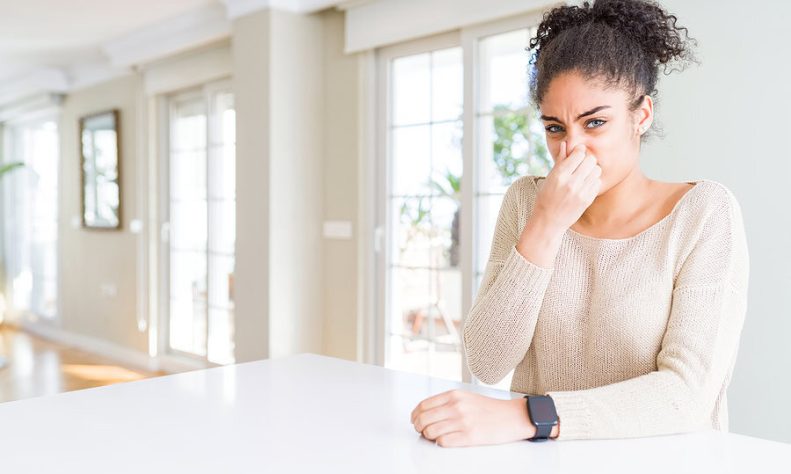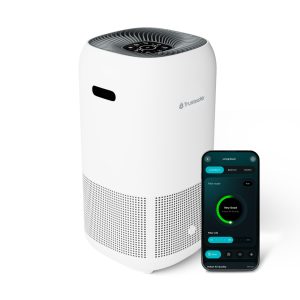
Table of Contents
ToggleYou’ve tried fragrance diffusers, scented candles, and the best-smelling laundry detergents, yet that dank, musty odor still lingers in your home and clothes. Is something nesting under the couch or inside the closet? Or perhaps your household cleaners or fabric softeners aren’t strong enough? While there are numerous possible reasons for that mysterious “thrift store smell,” it almost always traces back to mold.
Keep reading to learn how mold causes musty odors and how to remove it to keep your house and garments fresh and your family healthy.
When your nose catches a whiff of mustiness after stepping into your home or burying your face in a freshly washed towel, it’s natural to wonder what’s behind that odor—and perhaps feel a little embarrassed if guests notice it, too. While things like high humidity levels or poor ventilation can amplify musty odors, mold is usually the leading cause of the smell.
“Mold often creates a strong, musty smell because it releases certain chemicals called microbial volatile organic compounds (mVOCs) as it grows and breaks down materials,” explains mold and indoor air quality expert Michael Rubino. Many mVOCs are odorless, but some, like mycotoxins, often give off a stale, earthy smell reminiscent of wet socks or an old, locked-up attic.
Furthermore, mVOCs have a very low odor threshold, which means you may smell them at extremely low concentrations and, when you do, the odor is strong. However, the strength and type of smell emitted depend on several factors, including the species of mold, environmental conditions, and growth surface.
Mold often thrives in warm, damp, and poorly ventilated areas, from which mustiness can permeate your entire home. That said, here are some common sources of musty odors:
If you have wall-to-wall carpeting or a home full of rugs, you know how quickly they can get dingy and dirty. One day they’re noticeably clean, and the next they’re a shade darker and seemingly dirtier. That’s because these flooring materials often catch and hold a lot of hidden dirt, moisture, and everyday grime, leading to musty smells if they aren’t cleaned regularly. Spills, pet messes, dust, and humidity can settle deep into the fibers, encouraging mold and mildew growth that can exude musty odors. So, if you’re living or working spaces smell a bit like a damp basement, your carpets or rugs may be overdue for a deep clean.
Cleaning experts at The Maids report that “dust, dirt, dead skin cells, and other accumulation can cause odors, too.” When dirt and grime accumulate inside your HVAC system, they can mix with moisture from the air or the unit itself, creating “hiding spots” for mold, mildew, and bacteria. These organisms can grow and release that classic musty odors in your home or workplace.
If the smell comes from the vents and fills the entire room (or multiple rooms), you’ve likely got mold on the air filter or in your home’s ducts. If the odor is most potent when your cooling system runs, mold might be on the unit’s evaporator coil. As a result, the smell can spread throughout the whole room or house, says Danny Pen, president of Massachusetts-based New Era Plumbing & HVAC.

Even in the cleanest homes, musty or mildew smells can still be an issue, often due to clothing and linens that aren’t dried properly. Sometimes it’s as simple as forgetting to pull wet clothes from the washing machine, not cleaning the washer regularly, or body soils remaining in the fabric after washing.
Invisible body soils are one of the leading causes of laundry odor, says Professor of Chemistry and Biochemistry Jessica Zinna, Ph.D. “Our bodies are in constant contact with clothes, towels, and other fabrics that trap our body soils over time, causing that stinky and musty smell,” she explains. One study shows that most of what’s making your towels smell isn’t visible dirt, but those unseen body oils and residues.
Leaving damp clothes in the hamper for too long also allows odors to develop. The University of Missouri Extension explains that “molds that cause mildew flourish wherever it is damp, warm, poorly lighted, and/or where air is not circulated.” So, even if you’re diligent about laundry, a little extra moisture or a forgotten pile of clothes can quickly lead to that unpleasant musty scent.
When the air inside your home is stagnant, dirt, grime, mold, and airborne pollutants get trapped indoors, contributing to that ‘old house’ smell. And it makes sense—odors have nowhere to go without proper circulation. That means moisture from showers, cooking, or breathing can build up inside and settle into walls, carpets, and furniture. This built-up moisture spurs the growth of mold, mildew, and bacteria, potentially releasing those musty odors that make your home and clothing smell less than fresh.
According to UCLA Health, mold reproduces by forming microscopic spores that travel via air currents to new locations. If a spore falls on a surface with a food source and adequate moisture, it can quickly colonize and produce mVOCs that spout that familiar musty odor. As such, you might notice mustiness that starts in one area and crops up in others over time.
Some musty odors aren’t just unpleasant; they can also be a serious health hazard. For instance, musty air caused by mVOCs may contain mycotoxins, which some studies have linked to various medical problems, including:
If you or your family experience any of these symptoms, talk to your healthcare provider and check your home for mold.
A stubborn, musty smell often indicates that you need better air circulation or even an air purifying solution. Here’s how to banish it from your home and clothes:
Adequate ventilation helps move damp, stale air out and brings clean, dry air in. So, open up windows every day for at least 30 minutes. You can place a fan near the window or open doors across from the windows to create a cross-breeze. If you have a central HVAC system, set the fan to “on” so it circulates air throughout your home, and remember to change the air filters regularly. Also, don’t forget to turn on exhaust fans in your bathroom, kitchen, and laundry room, as these areas are more prone to moisture.
You probably don’t want to walk around with a stale, musty smell lingering behind you. Thankfully, ridding your fabrics of musty odors is pretty straightforward. First, you want to ensure there isn’t mold in your washer. You can clean internal surfaces with baking soda and white vinegar, dry them out properly with a towel, and open the door so the inside can air dry.
To remove mustiness from clothing, add equal parts water and white vinegar and a few drops of your favorite essential oil (like lavender) when washing musty laundry. Afterward, hang your clothes outside on a sunny day for further freshness. The UV rays from sunlight can destroy microorganisms that cause those musty smells in the first place, while the wind whisks away all the moisture.

A TruFlow Air Purifier is one of the most effective ways to clear indoor air of musty and other unwanted smells. The best air purifiers for odors use advanced HEPA filtration to capture 99.97% of mold spores and many other pollutants and allergens as small as 0.3 microns. They also feature an activated carbon filter that neutralizes gases and odors. With the odor-causing pollutants removed, the air is noticeably cleaner and fresher.
To get the most out of your air purifier, choose one powerful enough to clean the entire space. Also, make sure the purifier can monitor your indoor air quality in real time and automatically adjust the fan speed based on that. This helps maintain consistent protection while conserving energy.
Learn more: 7 Benefits of an Air Purifier for Your Health and Home | How Air Purifiers Help Reduce Allergies and Which One to Buy
Mold prevention is key to keeping your home and clothes fresh. No matter the measures you take, that musty, moldy smell will keep coming back unless you stop mold from growing to begin with. Mold loves damp environments, so keeping your home dry is crucial. With that in mind, look for leaks from plumbing, roof, or windows, and repair them immediately. If you notice standing water due to a spill or flooding incident, dry the area thoroughly within 24 hours to reduce the risk of mold growth.
Here are a few more useful ways to stop mold in its tracks:
If mold has already taken hold in your home, the EPA recommends hiring a mold cleanup specialist under certain conditions:
Otherwise, you can address the problem by finding the source and thoroughly cleaning the moldy area with commercial products or a combination of common cleaning agents you likely already own.
Musty smells can be stubborn, but you can bring that fresh, welcoming smell to your home and clothes with patience and the right approach. While preventing mold is key, simple measures like improving ventilation, cleaning carpets and rugs regularly, and drying clothes properly can make a huge difference. And if you want an extra boost, an air purifier can help keep your air smelling fresher and cleaner than ever.
Usually, no. The smell may linger or worsen unless you fix the underlying problem.
Febreze can mask the odor temporarily, but it won’t solve the root issue. You’ll need to address the source for lasting freshness.
Absolutely. Musty odors can be caused by hidden moisture damage, poor ventilation, or high humidity, even if mold isn’t visibly present. Other factors like stagnant air, dust, and debris in the HVAC system can also contribute to a musty smell.
Yes, air purifiers can help eliminate musty smells, including those caused by mold and mildew. TrustedAir’s air purifiers have HEPA and carbon filters that filter out 99.97% of airborne pollutants, such as mold spores and mVOCs known for causing musty smells.